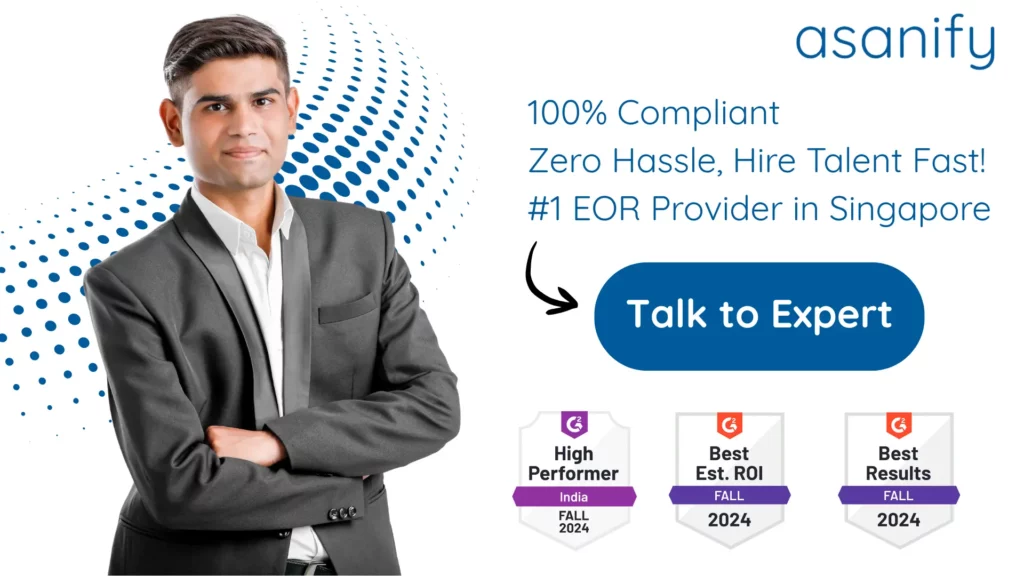Singapore in 2025 continues to be one of the most business-friendly destinations in Asia, attracting global companies for its strategic location, transparent regulations, and low corporate tax rates. With a thriving economy, excellent infrastructure, and access to ASEAN and global markets, the country is a preferred hub for multinational corporations, startups, and regional headquarters.
Cities like Singapore City and Jurong East host a diverse range of industries, including finance, technology, logistics, healthcare, and e-commerce. Companies planning to register a business in Singapore can take advantage of simplified incorporation procedures, digital governance, and attractive tax incentives, making it one of the easiest places in the world to start a business.
This guide covers market entry options, business structures, incorporation steps, documentation, compliance, costs, challenges, and Employer of Record (EOR) alternatives to help global companies expand into Singapore successfully.
Table of Contents
- Exploring Your Market Entry Options in Singapore
- Business Structures You Can Choose From
- Comparing Business Structure Options
- How to Choose the Right Business Model for Your Operations
- Step-by-Step Guide to Company Registration in Singapore
- Key Documents Required to Register Your Singapore Company
- Post-Incorporation Essentials You Shouldn’t Ignore in Singapore
- Additional Business Licenses and Registrations You Might Need in Singapore
- Timeframe to Set Up a Business in Singapore
- What Does It Cost to Incorporate a Company in Singapore?
- Obstacles Global Founders May Face While Setting Up in Singapore
- Incorporating as a Foreign-Owned Company: A Special Path
- Employer of Record: A Simpler Way to Hire in Singapore Without Incorporation
- Why Asanify is the Ideal Partner for Global Companies Entering Singapore
- Summary & Final Takeaways
- FAQs
Exploring Your Market Entry Options in Singapore
Foreign companies entering Singapore typically choose between two options:
Incorporating a Local Business Entity
Registering a company in Singapore is done through the Accounting and Corporate Regulatory Authority (ACRA). The process is fast, digital, and highly efficient. Incorporation is ideal for businesses seeking long-term presence, operational control, and local hiring capabilities.
Hiring Through an Employer of Record (EOR)
An Employer of Record provides a compliant way to hire employees in Singapore without setting up a legal entity. The EOR serves as the official employer for managing contracts, payroll, and tax purposes, while your company retains operational control. This model is ideal for market testing, short-term projects, or small distributed teams.
Business Structures You Can Choose From
Singapore offers several entity types for foreign and local investors:
- Sole Proprietorship – Easy to set up but no limited liability; suitable for small local businesses.
- Partnership – Shared ownership with partners jointly responsible for liabilities.
- Limited Liability Partnership (LLP) – Combines partnership flexibility with limited liability protection.
- Private Limited Company (Pte Ltd) – Most popular for foreign investors; offers limited liability and scalability.
- Branch Office – An extension of a foreign company; parent company is liable.
- Representative Office – For market research and liaison purposes; cannot generate revenue.
Comparing Business Structure Options
| Structure | Ownership | Liability | Taxation | Best For |
| Sole Proprietorship | 1 owner | Unlimited | Personal income tax | Small local ventures |
| Partnership | 2+ partners | Unlimited | Personal income tax | Small shared operations |
| LLP | 2+ partners | Limited | Personal income tax | Professional or consulting firms |
| Private Limited (Pte Ltd) | 1–50 shareholders | Limited | Corporate tax (17%) | Startups, SMEs, and foreign subsidiaries |
| Branch Office | Foreign parent | Parent liable | Corporate tax (17%) | Market entry for existing companies |
| Representative Office | Foreign parent | Parent liable | None | Market research or liaison only |

How to Choose the Right Business Model for Your Operations
The choice depends on your business size, liability appetite, and growth plans:
- Sole proprietorships and partnerships are suitable for small local businesses with minimal risk.
- LLPs work well for service-based or professional firms requiring limited liability.
- Pte Ltd is the preferred structure for foreign companies and startups seeking tax benefits, scalability, and investor confidence.
- Branch and representative offices suit companies testing the market or coordinating operations from abroad.
- EOR is the best choice for rapid entry without setting up an entity.
Suggested Read: Labour Laws in Singapore: A Complete 2025 Guide
Step-by-Step Guide to Company Registration in Singapore
- Decide on the business structure (Pte Ltd, LLP, etc.).
- Reserve your company name through ACRA’s BizFile portal.
- Appoint at least one local director who is a Singapore citizen, PR, or holder of an EntrePass/EP.
- Prepare and file the company constitution (formerly Memorandum & Articles of Association).
- Register the company with ACRA and receive the Certificate of Incorporation.
- Obtain a company business profile from ACRA as proof of registration.
- Open a corporate bank account with a local bank.
- Register for Goods and Services Tax (GST) if annual turnover exceeds SGD 1 million.
- Set up Central Provident Fund (CPF) accounts for local employees.
Key Documents Required to Register Your Singapore Company
- Passports or IDs of all directors and shareholders
- Proof of residential address for directors and shareholders
- Proposed company name and business activity details
- Company constitution (Articles of Association)
- Board resolution for foreign companies establishing a branch or subsidiary
- Lease agreement for the registered office address in Singapore
Post-Incorporation Essentials You Shouldn’t Ignore in Singapore
After incorporation, companies must meet ongoing compliance obligations:
- Appoint a company secretary within six months of incorporation
- File annual returns and maintain proper accounting records
- Hold an annual general meeting (AGM) for Pte Ltd companies
- Register for GST if turnover exceeds the threshold
- Contribute to the CPF for eligible employees
- Maintain licenses for regulated business activities such as finance or healthcare

Additional Business Licenses and Registrations You Might Need in Singapore
Depending on your industry, additional approvals may be required:
- Food and Beverage License from Singapore Food Agency (SFA)
- Financial services licenses from the Monetary Authority of Singapore (MAS)
- Import/export permits for trading companies
- Health and safety permits for industrial or manufacturing operations
Timeframe to Set Up a Business in Singapore
| Step | Estimated Duration |
| Company name reservation | 1–2 business days |
| Filing incorporation documents | 1–3 business days |
| Bank account opening and GST registration | 3–7 business days |
| CPF and post-incorporation setup | 3–5 business days |
| Total Time to Register | 7–15 business days |
Delays may occur if additional regulatory approvals or bank verification are required.
What Does It Cost to Incorporate a Company in Singapore?
- ACRA registration fee: SGD 315 for Pte Ltd
- Company secretary and compliance setup: SGD 500–1,500
- Corporate bank account and annual maintenance: SGD 200–500
- Optional licenses and permits: SGD 200–2,000
- Accounting and filing services: SGD 800–2,000 annually
Overall, incorporation costs typically range from SGD 1,500 to 4,000, excluding share capital requirements.
Obstacles Global Founders May Face While Setting Up in Singapore
- Requirement for at least one local resident director
- Sector-specific licensing for finance, healthcare, and F&B industries
- Need for compliance with strict annual filing and reporting requirements
- Banking processes may require in-person verification
- High office rental costs in central Singapore for physical operations
Incorporating as a Foreign-Owned Company: A Special Path
Foreign companies can operate in Singapore through:
- Wholly Foreign-Owned Subsidiary (Pte Ltd) – Most common and preferred option
- Branch Office – Extension of a foreign company with parent liability
- Representative Office – For non-commercial activities and market exploration
Singapore allows 100% foreign ownership in most sectors, though some regulated industries require additional approvals from government authorities.

Employer of Record: A Simpler Way to Hire in Singapore Without Incorporation
Entering the Singapore market does not always require setting up a legal entity. For many global companies, particularly those exploring the market or running pilot projects, an Employer of Record (EOR) provides a fast and fully compliant solution to hire employees in Singapore without the costs and complexities of incorporation.
From a legal perspective, the EOR acts as the official employer for your Singapore-based workforce. It handles employment contracts, payroll processing, Central Provident Fund (CPF) contributions, and tax withholdings in line with Singapore’s labor regulations. Meanwhile, your company maintains full control over employees’ day-to-day tasks, responsibilities, and performance.
This model is ideal for:
- Testing the Singapore market before committing to a permanent entity
- Running short-term or project-based teams for sales, support, or R&D
- Hiring remote Singaporean employees to join global operations
- Rapid expansion into Southeast Asia without immediate regulatory complexity
Using an EOR also protects foreign companies from the administrative and compliance challenges of:
- Drafting Singapore-compliant employment contracts
- Managing payroll, CPF contributions, and personal tax reporting
- Handling statutory benefits such as paid leave and health coverage
- Ensuring compliance with the Employment Act and MOM (Ministry of Manpower) requirements
By leveraging an EOR, businesses reduce the risk of non-compliance, worker misclassification, and potential labor disputes, while achieving a quick and cost-efficient market entry.
Suggested Read: EOR Singapore: A Detailed Guide 2025
Why Asanify is the Ideal Partner for Global Companies Entering Singapore
Asanify supports global businesses with both full incorporation and Employer of Record services in Singapore. For companies seeking long-term operations, we provide end-to-end assistance throughout the registration process:
- Choosing the right legal structure (Private Limited Company, LLP, or Branch Office)
- Filing company registration with ACRA and securing the Certificate of Incorporation
- Registering for GST and corporate tax with IRAS
- Setting up payroll, CPF contributions, and HR compliance
- Managing post-incorporation filings and reporting obligations
If you are not ready to incorporate, our Employer of Record solution allows you to hire Singapore employees in just a few days. Asanify handles all local employment contracts, payroll processing, CPF contributions, and statutory compliance, ensuring your team operates legally without administrative burdens.
Asanify has successfully assisted clients across Asia, Europe, the US, and the Middle East in entering the Singapore market quickly and risk-free. Whether you are a startup testing regional demand or a multinational establishing a satellite team, we make your Singapore expansion seamless and compliant.
Summary & Final Takeaways
Expanding into Singapore in 2025 offers tremendous opportunities for global companies, but selecting the right market entry strategy is essential. Businesses typically have two main options: incorporating a Singaporean entity (Pte Ltd or Branch) or hiring through an Employer of Record (EOR).
If your goal is to establish a long-term presence, build brand credibility, or raise capital, setting up a registered company is the best option. On the other hand, if you are focused on rapid market entry, testing operations, or building a small local team without administrative complexity, an EOR enables you to start quickly and stay fully compliant with Singapore’s labor laws.
FAQs
It usually takes 7–15 business days, depending on bank account setup and regulatory approvals.
Yes, Singapore allows 100% foreign ownership for most business sectors.
A Pte Ltd company can be registered with as little as SGD 1 in paid-up capital.
Not necessarily, but at least one local resident director is required by law.
Yes, you can use an Employer of Record (EOR) to hire employees compliantly.
Corporate income tax is 17%, and GST applies for companies with revenue above SGD 1 million.
Most sectors allow full foreign ownership, but finance, media, and healthcare may need additional approvals.
Passports, proof of address, company constitution, and a local office lease are required.
Finding a local director, opening a bank account, and obtaining industry-specific licenses can be challenging.
Using an Employer of Record (EOR) allows immediate and fully compliant hiring.
Not to be considered as tax, legal, financial or HR advice. Regulations change over time so please consult a lawyer, accountant or Labour Law expert for specific guidance.

